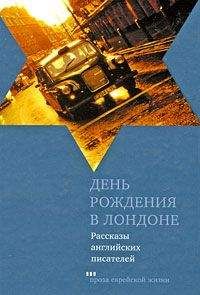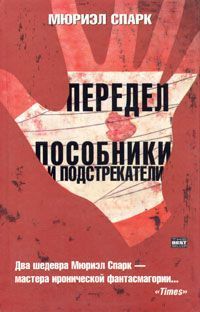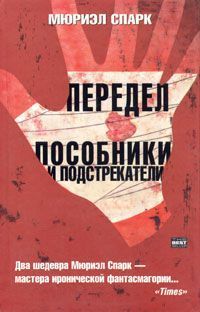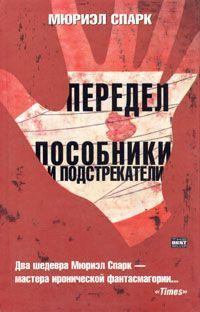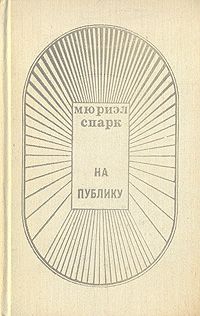Мюриэль Спарк - Английский язык с Мюриэль Спарк (рассказы)
injection [In'GekS(q)n] disappointment ["dIsq'pOIntmqnt] widowed ['wIdqVd]
For the first five years of their married life they had been worried about not having children. Both had submitted themselves to medical tests as a result of which Lou had a course of injections. These were unsuccessful. It had been a disappointment since both came from large sprawling Catholic families. None of their married brothers and sisters had less than three children. One of Lou's sisters, now widowed, had eight; they sent her a pound a week.
Their flat in Cripps House had three rooms and a kitchen (в их квартире в Криппс Хауз было три комнаты и кухня). All round them their neighbours (все вокруг них, их соседи) were saving up to buy houses (экономили деньги, чтобы купить дома; to save — оберегать, беречь; экономить). A council flat (квартира, данная Городским Советом), once obtained (раз полученная), was a mere platform in space (была простой платформой в пространстве: «космосе») to further the progress of the rocket (которая поспособствует продвижению ракеты; to further — продвигать, содействовать). This ambition was not shared by Raymond and Lou (это стремление не разделялось Раймондом и Лу; ambition — честолюбие, объектжеланий); they were not only content (они были не только удовлетворены), they were delighted (они были восхищены), with these civic chambers (этими предоставленными городом меблированными комнатами; civic — городской, оплачиваемыйизсредствгорода), and indeed took something of an aristocratic view of them (и на самом деле, смотрели на них с аристократической точки зрения), not without a self-conscious feeling of being free (не без смущающего чувства свободы), in this particular (в этом отношении), from the prejudices of that middle class (от предрассудков среднего класса) to which they as good as belonged (к которому они, в общем-то, принадлежали; as good as — всущности, фактически). "One day (однажды: «одним днем»)," said Lou (говорила Лу), "it will be the thing to live in a council flat (это будет очень модно — жить в городской квартире; just the thing — такполагается, сейчасэтомодно)."
obtain [qb'teIn] delighted [dI'laItId] self-conscious ["self'kOnSqs]
Their flat in Cripps House had three rooms and a kitchen. All round them theirneighbourswere saving up to buy houses. A council flat, once obtained, was a mere platform in space to further the progress of the rocket. This ambition was not shared by Raymond and Lou; they were not only content, they were delighted, with these civic chambers, and indeed took something of an aristocratic view of them, not without a self-conscious feeling of being free, in this particular, from the prejudices of that middle class to which they as good as belonged. "One day," said Lou, "it will be the thing to live in a council flat."
They were eclectic as to their friends (они были эклектичны в выборе: «что касается их» друзей). Here (в этом: «здесь»), it is true (надо признать: «это правда»), they differed slightly from each other (они отличались слегка друг от друга). Raymond was for inviting the Ackleys to meet the Farrells (Раймонд выступал за то, чтобы пригласить Экли познакомиться с Фарреллами; tobeforsmth. — быть за;toinvite— приглашать). Mr. Ackley was an accountant at the Electricity Board (мистер Экли работал: «был» бухгалтером в департаменте по электричеству). Mr. and Mrs. Farrell were respectively a sorter at Manders’ Figs in Syrup and an usherette at the Odeon (мистер и миссис Фаррелл были соответственно сортировщиком /на заводе/ «Инжир в Сиропе Мандерса» и, билетершей в Одеоне; OdeonCinemas— цепь кинотеатров в Великобритании).
"After all (в конце концов)," argued Raymond (убеждал Раймонд;toargue— спорить, аргументировать), "they're all Catholics (все они католики)."
"Ah well (ну хорошо)," said Lou, "but now, their interests are different (но сейчас, их интересы различны). The Farrells wouldn't know what the Ackleys were talking about (Фарреллы не поймут: «не будут знать» о чем говорят Экли). The Ackleys like politics (Экли любят /говорить о/ политике). The Farrells like to tell jokes (Фарреллы любят рассказывать анекдоты; joke— шутка). I'm not a snob, only sensible (я не сноб, я просто благоразумна)."
inviting [In'vaItIN] usherette ["ASq'ret] sensible ['sensqb(q)l]
They were eclectic as to their friends. Here, it is true, they differed slightly from each other. Raymond was for inviting the Ackleys to meet the Farrells. Mr. Ackley was an accountant at the Electricity Board. Mr. and Mrs. Farrell were respectively a sorter at Manders" Figs in Syrup and an usherette at the Odeon
"After all," argued Raymond, "they're all Catholics."
"Ah well," said Lou, "but now, their interests are different. The Farrells wouldn't know what the Ackleys were talking about. The Ackleys like politics. The Farrells like to tell jokes. I'm not a snob, only sensible."
"Oh, please yourself (о, поступай, как считаешь нужным; pleaseyourself! — делайте, как хотите)." For no one could call Lou a snob (потому как никто не мог назвать Лу снобом), and everyone knew she was sensible (и все знали, что она была благоразумной).
Their choice of acquaintance was wide (их выбор знакомых был широким) by reason (по причине) of their active church membership (их активной религиозной деятельности: «активного церковного членства»; membership — членство, званиечлена): that is to say (иначе говоря), they were members of various guilds and confraternities (они были членами различных гильдий: «организаций» и братств). Raymond was a sidesman (Раймонд был помощником церковного старосты), and he also organized the weekly football lottery (он также организовывал еженедельную футбольную лотерею) in aid of the Church Decoration Fund (в помощь Фонда убранства церкви). Lou felt rather out of things (Лу чувствовала себя довольно не у дел) when the Mothers' Union met (когда собирался Союз Матерей) and had special Masses (и служили: «имели» специальные обедни; Mass — месса, литургия), for the Mothers' Union was the only group she did not qualify for (так как Союз Матерей был единственной группой, к которой она не подходила; to qualify — обучать/ся/,подготавливать/ся/,бытькомпетентным). Having been a nurse before her marriage (так как она была санитаркой до замужества) she was, however, a member of the Nurses' Guild (она была, однако, членом Гильдии Медицинских Сестер).
Thus (таким образом), most of their Catholic friends (большинство из их друзей-католиков) came from different departments of life (были: «приходили» из разных сфер: «отделов» жизни). Others (другие), connected with the motor works where Raymond was a foreman (связанные с автомобильным заводом, где Раймонд был мастером), were of different social grades (были из различных социальных слоев; grade — степень, качество, класс) to which Lou was more alive than Raymond (о которых Лу имела больше представлений, чем Раймонд; to be alive to a fact — явнопредставлятьсебекакой-тофакт, alive — живой). He let her have her way (он позволял ей поступать, как она считает нужным: «действовать по своему»), as a rule (как правило), when it came to a question of which would mix with which (когда доходило до вопроса, кто из них сможет сойтись с кем; tomix— смешивать, соединять; общаться).
acquaintance [q'kweIntqns] guild [gIld] rule [ru: l]
"Oh, please yourself." For no one could call Lou a snob, and everyone knew she was sensible.
Their choice of acquaintance was wide by reason of their active church membership: that is to say, they were members of various guilds and confraternities. Raymond was a sidesman, and he also organized the weekly football lottery in aid of the Church Decoration Fund Lou felt rather out of things when the Mothers' Union met and had special Masses, for the Mothers' Union was the only group she did not qualify for. Having been a nurse before her marriage she was, however, a member of the Nurses' Guild.
Thus, most of their Catholic friends came from different departments of life. Others, connected with the motor works where Raymond was a foreman, were of different social grades to which Lou was more alive than Raymond. He let her have her way, asa rule, when it came to a question of which would mix with which.
A dozen Jamaicans (десятки выходцев с Ямайки; dozen — дюжина) were taken on at the motor works (были приняты на работу на автомобильный завод). Two came into Raymond's department (двое /из них/ поступили: «пришли» в отдел Раймонда). He invited them to the flat (он пригласил их к себе домой: «в квартиру») one evening (как-то вечером) to have coffee (выпить кофе). They were unmarried (они были холосты), very polite and black (очень вежливы и черны). The quiet one was called Henry Pierce (того, что потише: «тихого» звали Генри Пирс) and the talkative one, Oxford St. John (а разговорчивого — Оксфорд Сент-Джон). Lou, to Raymond's surprise and pleasure (Лу, к удивлению и удовольствию Раймонда), decided that all their acquaintance (решила, что все их знакомые), from top to bottom (от самой верхушки до самого низа), must meet Henry and Oxford (должны встретиться с Генри и Оксфордом). All along (все это время) he had known she was not a snob (он знал, что она не была снобом), only sensible (всего лишь разумной), but he had rather feared (но он почти боялся, что) she would consider (она подумает) the mixing of their new black and their old white friends not sensible (что смешение их новых черных /друзей/ со старыми белыми друзьями — неразумно).
"I'm glad you like Henry and Oxford (я рад, что тебе понравились Генри и Оксфорд)," he said. "I'm glad we’re able to introduce them (что мы сможем представить их) to so many people (такому большому количеству людей)." For the dark pair had (и пара темнокожих: «темная пара»), within a month (в течение месяца), spent nine evenings at Cripps House (провела девять вечеров в Криппс Хауз); they had met accountants (они встретились с бухгалтерами), teachers (учителями), packers (упаковщиками), and sorters (и сортировщиками). Only Tina Farrell (только Тина Фаррелл), the usherette (билетерша), had not seemed to understand (казалось, не понимала) the quality of these occasions (ценность этих встреч; quality — качество): "Quite nice chaps (довольно приятные парни), them darkies (эти черные; darky — негр, черномазый), when you get to know them (когда познакомишься с ними поближе)."
talkative ['tO: kqtIv] acquaintance [q'kweIntqns] occasion [q'keIZ(q)n]
A dozen Jamaicans were taken on at the motor works. Two came into Raymond's department. He invited them to the flat one evening to have coffee. They were unmarried, very polite and black. The quiet one was called Henry Pierce and the talkative one, Oxford St. John. Lou, to Raymond's surprise and pleasure, decided that all their acquaintance, from top to bottom, must meet Henry and Oxford. All along he had known she was not a snob, only sensible, but he had rather feared she would consider the mixing of their new black and their old white friends not sensible.
"I'm glad you like Henry and Oxford," he said. "I'm glad we're able to introduce them to so many people." For the dark pair had, within a month, spent nine evenings at Cnpps House; they had met accountants, teachers, packers, and sorters. Only Tina Farrell, the usherette, had not seemed to understand the quality of these occasions: "Quite nice chaps, them darkies, when you get to know them."
"You mean Jamaicans (ты имеешь в виду жители Ямайки)," said Lou. "Why shouldn’t they be nice (почему им не быть: «они не должны быть» милыми)? They're no different from anyone else (они ничем не отличаются от любого другого)."
